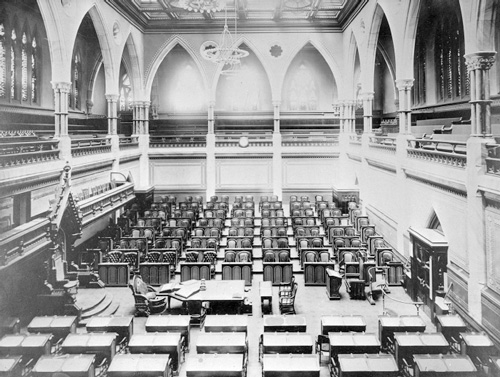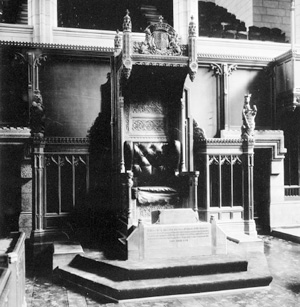Work in the House of Commons
The House of Commons follows a parliamentary calendar with a schedule of sittings and adjournments running from mid-September through late June. The fiscal year 2008-2009 marked the end of the 39th Parliament and the beginning of the 40th Parliament.
In 2008, the House continued its work as part of the second session of the 39th Parliament, until rising for the summer break on June 20, 2008. On September 7, 2008, before the House resumed for the fall sitting, the Prime Minister asked the Governor General to dissolve Parliament and call an election. Following the general election on October 14, 2008, the 40th Parliament was summoned to meet on November 18, 2009.
The House of Commons in Session
Meetings of the House of Commons are known as sittings and follow a prescribed format. They are overseen by the Speaker, who is responsible for managing debate and preserving order in accordance with the written rules (Standing Orders) and practices of the House. The Speaker is an elected Member of Parliament who, in a secret ballot, is chosen to be Speaker by the other Members.
At the beginning of the 40th Parliament, the Hon. Peter Milliken was elected Speaker for the fourth consecutive time, a record. Mr. Milliken is a member of the Official Opposition but, as Speaker, he does not attend caucus meetings.
In addition to presiding over the Chamber, the Speaker is Chair of the Board of Internal Economy, which oversees the administration of the House. He is also the spokesperson and formal representative of the House when conducting business outside the House of Commons.
The Speaker is assisted by three deputies selected from among the Members: the Deputy Speaker and Chair of Committees of the Whole, the Deputy Chair of Committees of the Whole, and the Assistant Deputy Chair of Committees of the Whole. In those positions during the 39th Parliament, respectively, were the Hon. Bill Blaikie, Mr. Royal Galipeau and Mr. Andrew Scheer. At the beginning of the 40th Parliament, Mr. Andrew Scheer, Ms. Denise Savoie and Mr. Barry Devolin, respectively, were elected to those positions by motions adopted in the House.
The Clerk of the House of Commons is the senior permanent official and chief executive of the House Administration. She advises and supports the Speaker, the other Chair occupants, the House and its committees in all procedural and administrative matters. She also keeps the official record of proceedings.
Making Laws
Lawmaking is one of the most important functions of the House of Commons. Laws start out as bills, which are proposals to either create new laws or amend existing ones. A bill must be approved by the Senate and the House of Commons and receive Royal Assent before it becomes law. The time required to pass a bill can vary depending on the urgency, the complexity and the degree of consensus among Members of both the Senate and the House.
There are two main types of bills: public and private. Public bills concern matters of public policy, such as finance or national security, while private bills, which are rare, deal with private interests. Public bills can be divided into Government Bills and private Members' bills. The former are those sponsored by the government and introduced by a Cabinet Minister, and the latter are sponsored by a Member who is not a Minister or a Parliamentary Secretary.
Bills may be introduced in the House of Commons or the Senate. However, all those that involve raising or spending public funds must be introduced in the House of Commons.

Interior of Chamber, 1916
Photo: D.A.
McLaughlin/Library and Archives
Canada/C-003913
Over the past fiscal year, a combined total of 44 Government Bills were introduced in the 39th Parliament and the 40th Parliament. These bills covered a wide range of social, economic and political issues, including:
- limiting credit for time spent in pre-sentencing custody;
- organized crime and protection of justice system participants;
- protection of the environment;
- civil liability and compensation for damage in case of a nuclear incident; and
- family homes situated on First Nation reserves.
From April 1, 2008 to March 31, 2009, 199 private Members' public bills were introduced in the House of Commons. These focused on a range of issues, such as:
- amendments to the Criminal Code;
- amendments to the Employment Insurance Act;
- amendments to the Immigration and Refugee Protection Act;
- establishing an Economic Development Agency of Canada for the Region of Northern Ontario;
- providing certain rights to air passengers;
- amendments to the Competition Act and the Canadian Environmental Protection Act, 1999;
- amendments to the Income Tax Act;
- amendments to the Supreme Court Act;
- the Italian-Canadian Recognition and Restitution Act;
- amendments to the Canadian Forces Superannuation Act and the Royal Canadian Mounted Police Act; and
- amendments to the Official Languages Act.
In the legislative process, Members have opportunities to propose amendments to bills under consideration. In the period covered by this report, Members proposed more than 400 motions of amendment at the committee and report stages of the process.
Seeking and Providing Information
An important function of the House of Commons is to provide an opportunity for Members to question the government about its actions and policies. During the daily 45-minute Question Period, members of the opposition parties can ask questions of the Prime Minister or Cabinet Ministers on matters within the administrative responsibility of the government. When detailed, lengthy or technical information is being sought from the government, questions can be submitted in writing. The government's replies are later tabled in the House of Commons.
In the last fiscal year, during both the 39th and 40th Parliaments, a total of 3,622 oral questions were asked and 178 written ones were submitted. During the year, an average of 39 questions were asked per Question Period.

Speaker's Chair, 1921
Photo: Library and Archives Canada/C-00197
Opposition parties can also raise issues of concern by selecting topics for the House to debate on allotted days known as opposition days or supply days. In each calendar year, 22 days are set aside for consideration of motions sponsored by members of the opposition parties. The number of days for each party is allocated based on party representation and through consultations among the opposition parties. For example, during the 39th Parliament, some opposition days were devoted to compliance with the Charter of the French Language by enterprises under federal jurisdiction located in Quebec, corporate tax cuts, the creation of a special committee on the Canadian mission in Afghanistan, Elections Canada, general interest television licence holders, economic policy and the Conflict of Interest Code for Members of the House of Commons. And during the 40th Parliament, opposition days were used to discuss such issues as Canada-United States relations, establishing a national securities commission, amending the equalization formula, municipal infrastructure, employment insurance, science, research and innovation, and the forestry industry.
Tabling Documents
Tabling a document in the House of Commons is a formal way of presenting information and putting it on the official public record. A variety of documents must be tabled, such as annual reports of departments and agencies, non-judicial Order-in-Council appointments, government responses to committee reports and other papers concerning matters related to the administrative responsibilities of the government (for example, treaties with other countries). These documents are called sessional papers.
In the fiscal year 2008-2009, 714 sessional papers were tabled during the 39th Parliament and 809 were tabled during the 40th Parliament.
Following the Rules
The daily activities in the Chamber are governed by a set of written rules called the Standing Orders as well as by a set of practices and traditions, some of which have been handed down through hundreds of years and others developed more recently. The House of Commons continues to develop and modify its rules and practices. In 2008-2009, the House of Commons made amendments to Standing Order 104(2) in relation to the number of members on certain standing committees, which provided that committees chaired by an opposition member would be reduced from 12 to 11 members; to Standing Order 108(3)(b) concerning the mandate of the Standing Committee of Citizenship and Immigration; and to Standing Order 108(3)(d) concerning the mandate of the Standing Committee on Human Resources, Skills and Social Development and the Status of Persons with Disabilities.
Another way House practices change and evolve is through decisions by the Speaker, called rulings. These rulings involve the Speaker's interpretation of the rules and precedents of the House. Sometimes the Speaker delivers these rulings immediately from the Chair on a point of order being raised in the House. In other cases, if the situation demands a more in-depth examination of the facts and review of precedent, the Speaker takes the matter under advisement and a detailed ruling is delivered.
In the past year, the Speaker delivered more than a dozen rulings in response to points of order raised in the Chamber. These rulings touched on such matters as the admissibility of a committee report, the use of House resources, parliamentary language, departmental advertising and a report of the Ethics Commissioner.
Canada's Parliamentary System

Legislative Statistics for 2008-2009
Government Bills introduced: 44
Private Members' public bills introduced: 199
Come and See
Canadian and international visitors learn about the heritage buildings, parliamentary tradition and the modern workings of Parliament through tours and interpretive programs.
Tour Statistics for 2008-2009
Total Centre Block tours: 11,318 (344,347
visitors)
Total East Block tours: 1,274 (12,372 visitors)
Total school group visits to Centre Block: 1,366
(51,090 visitors)
Total visitors to the Peace Tower and Memorial
Chamber: 240,833



